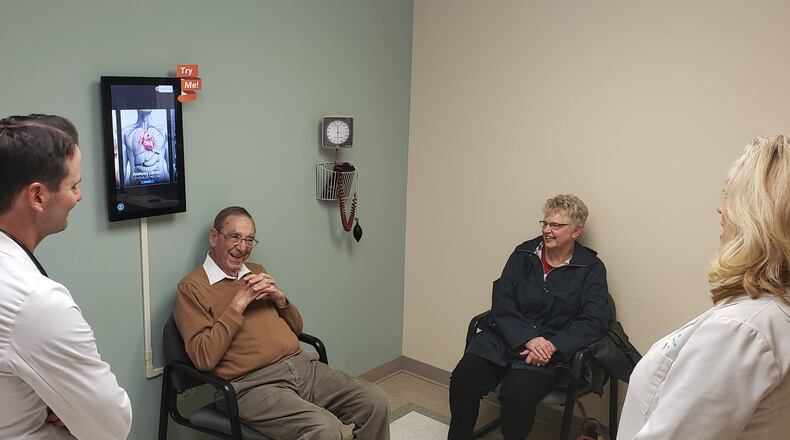Instead of making a large incision in the chest, the medical team at Mercy Health-Fairfield Hospital inserts a catheter into one of the leg arteries, which serves as a path to deliver the new valve.
The replacement valve is crimped very tightly on a balloon, advanced through the catheter to the diseased valve and deployed with balloon inflation. Upon deflation and removal of the balloon, the new valve works immediately to help most patients experience instant benefit.
“It was designed in an attempt to avoid the trauma of open-heart surgery in patients that were considered not necessarily inoperable but high-risk for open-heart surgery,” said Dr. Daniel Eckert, a cardiologist with Mercy Health-The Heart Institute. “It was designed for people in their 80s and 90s, because we know that they don’t convalesce well after surgeries.”
MORE: 13 new restaurants that opened in Butler County in 2019
Although the procedure has been performed 300 times, Mercy Health officials emphasize that it’s about quality, not quantity, and aimed at giving patients a positive outcome.
“Since launching the program, we have treated numerous patients with complicated aortic, mitral and tricuspid valve disorders,” Eckert said. “We enjoyed exceptional outcomes with 100 percent procedural success. These outcomes are among the best in the country and highlight our commitment to providing cutting-edge technology with unparalleled safety to the community.”
The institute’s 300th patient for the procedure was 92-year-old Thomas Banks, of Harrison, who on Christmas Day 2013 had atrial fibrillation or AFIB, a tachycardia arrhythmia that occurs when the upper chambers of the heart do not beat properly causing an irregular heartbeat.
MORE: New housing boomed in the Butler County region this fall. What does that mean for 2020?
Banks said he was happy to not have open heart surgery as “nobody wants to go through that” and that the TAVR procedure in October was much easier than he thought it would be.
“I expected it to be really traumatic but it wasn’t,” said Banks, who is an insurance agent who continues to work from home.
After just one night in the hospital, he went home and noticed he began to feel better immediately.
“I’m very pleased that I did that,” he said. “I’m not short of breath and have more stamina.”
Eckert said Banks has, within reason, “no restrictions” to his daily activity.
“You can run a marathon with your valve. It’s not going anywhere,” he told Banks during a Dec. 19 check-up.
Even patients deemed inoperable for other more invasive procedures returned a week after the TAVR procedure looking “fantastic,” Eckert.
“This is the rule,” he said. “The going home at 24 hours and us assigning them to their general cardiologist at three months or even as early as a month is kind of evidence that that’s the case.”
MORE: Hamilton’s newest restaurant hopes to offer many experiences in high-profile space
Complication rates for the procedure are “almost zero,” Eckert said.
Eckert is part of a multidisciplinary TAVR team that includes The Heart Institute cardiologist Dr. Jonathan Rapp and Mercy Health cardiovascular and thoracic surgeons doctors William Cook and S. Russell Vester. They perform the procedure at Mercy Health-Fairfield Hospital.
While the procedure is performed at Cincinnati area hospitals like University of Cincinnati Medical Center and The Christ Hospital, Mercy Health-Fairfield Hospital is the only Butler County hospital that offers the procedure, Eckert said.
Patients suffering from any valvular disease may be potential candidates for this approach. The team performs the procedure, which takes less than 60 minutes, typically under twilight sedation in the cardiac cath lab. TAVR carries a very low risk of complications and patients are generally ready for discharge within 24 hours, with complete recovery in less than a week, according to Mercy Health officials.
Eckert said the program has developed “enormously” since bringing on Jami Heil as TAVR program coordinator four years ago.
“I can’t express how important it is to have an active program coordinator who is really passionate about the program,” he said. “It’s all about the TLC that she gives to patients.”
For more information about TAVR, call Heil at 513-316-2450.
About the Author

